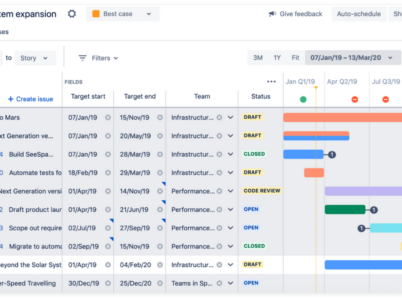Zoho Projects is a cloud-based project management software developed by Zoho Corporation, a renowned software company that provides a wide range of business solutions. It enables teams to plan, track, and collaborate on projects effectively, making it an ideal choice for small to large businesses across various industries.

- Jira project management: Jira Software is built specifically for agile teams. It offers features such as Kanban boards, Scrum boards, and backlog management to help teams plan, track, and organize their work in iterative cycles.
- Jira issue tracking: Jira Software provides robust issue tracking capabilities. Users can create, prioritize, and assign tasks or issues to team members, set due dates, add comments, and track the progress of each item throughout its lifecycle.
- Customizable Workflows: Jira Software allows teams to create customized workflows and Jira dashboards that match their specific processes and workflows. This flexibility enables teams to define their own stages, transitions, and conditions for issue progress, ensuring that the tool aligns with their unique workflows.
- Collaboration and Communication: Jira Software and Jira cloud facilitates collaboration within teams by providing features like mentions, comments, and attachments on issues. Team members can communicate and collaborate in real-time, ensuring everyone is on the same page and information is easily accessible.
- Reporting and Analytics: Jira Software offers a range of reporting and analytics features. It provides various built-in reports, such as burndown charts, velocity charts, and cumulative flow diagrams, to help teams gain insights into their progress, identify bottlenecks, and track performance over time.
- Integration Ecosystem: Jira Software integrates with a wide range of tools and services, allowing teams to connect their project management workflows with other tools they use. It integrates with development tools like Bitbucket and GitHub, collaboration tools like Confluence, and offers a marketplace with numerous add-ons and extensions.
- Customization and Extensibility: Jira Software can be customized to fit the specific needs of different teams and organizations. Users can create custom fields, issue types, and workflows, and extend its functionality with various add-ons and plugins available in the Atlassian Marketplace.
- Jira Agile Methodology: Jira embraces the agile methodology, enabling teams to adapt to changing requirements and work iteratively. Its agile boards, including Scrum and Kanban, facilitate efficient task management and promote collaboration among team members.
- Customization: Jira offers extensive customization options, allowing teams to tailor the software to their specific needs. From workflows and issue types to fields and screens, Jira can be configured to align with any project management process.
- Integration Capabilities: Jira seamlessly integrates with a wide range of tools, including development and collaboration platforms, testing tools, and customer support systems. This integration ecosystem enhances productivity by bringing all relevant information and actions into a centralized platform.
- Software Development Teams: Jira Software is ideal for software development teams of all sizes, from startups to enterprise-level organizations. Its agile capabilities and robust issue tracking system provide developers with a collaborative and streamlined environment to manage their projects effectively.
- Project Managers: Jira’s project management features make it a valuable asset for project managers in any industry. It empowers them to oversee tasks, allocate resources, and monitor progress, ensuring projects are delivered on time and within budget.
- Free Plan
Free Plan: Priced at $0, always free for 10 users, monthly subscription only
- Standard Plan
Standard Plan: Priced at $7.75 per user (estimated) and $77.50 per month<br />
$790 per year
- Premium Plan
Premium Plan: Priced at $15.25 per user (estimated) and $152.50 per month<br />
$1,525 per year
- Trello: Trello is a visually-oriented project management tool that uses boards, lists, and cards to help teams organize and prioritize tasks. It is user-friendly and suitable for small to medium-sized teams.
- Asana: Asana is a flexible project management tool that allows teams to track tasks, collaborate, and manage projects. It offers various features such as task assignments, due dates, and progress tracking.
- Monday.com: Monday.com is a visual project management tool that offers customizable boards and workflows. It provides a wide range of features for team collaboration, task management, and project tracking.
- Basecamp: Basecamp is a project management and team communication tool that emphasizes simplicity and ease of use. It offers features such as to-do lists, file sharing, message boards, and scheduling.
- Wrike: Wrike is a comprehensive project management tool that offers features like task management, collaboration, Gantt charts, time tracking, and reporting. It is suitable for both small and large teams.
- GitLab: GitLab is primarily a version control and source code management platform, but it also offers project management features. It allows teams to track issues, create boards, and manage projects using Git-based workflows.

Jira is a powerful project management software developed by Atlassian, a renowned software company. It is designed to streamline and simplify the project management process, offering teams an agile ticketing system to track, prioritize, and manage tasks effectively. Jira provides an intuitive interface, extensive customization options, and seamless integration with other Atlassian products, making it a comprehensive solution for project management.
Jira and Trello are both popular project management tools, but they have some key differences in terms of their features and target audiences. Here’s a comparison between Jira and Trello:
- Complexity: Jira is a robust and feature-rich tool that offers a wide range of functionalities, making it suitable for complex projects and large teams. It provides advanced features like custom workflows, issue linking, extensive reporting, and agile project management capabilities. Trello, on the other hand, is simpler and more user-friendly, designed for smaller teams or individuals who prefer a lightweight and visual approach to project management.
- Flexibility: Jira allows for highly customizable workflows and issue types, making it suitable for various project management methodologies like Agile, Scrum, or Kanban. It offers more control and flexibility for managing complex projects and processes. Trello, with its Kanban board interface, provides a more straightforward and adaptable approach to project management, which is better suited for simpler projects or teams that prefer a more visual representation of tasks.
- Integrations: Both Jira and Trello offer integrations with other tools, but Jira has a wider range of integrations available due to its popularity and extensibility. Jira integrates well with development tools like Git, Bitbucket, and Jenkins, making it a popular choice for software development teams. Trello integrates with various third-party applications as well but may have a more limited range of options compared to Jira.
- Target Audience: Jira is often favored by software development teams due to its advanced project management capabilities, issue tracking, and integration with development tools. It is commonly used for complex projects that require robust workflow management and reporting. Trello, with its simplicity and visual nature, is popular among small teams, startups, and individuals who want a lightweight project management solution without the complexity of Jira.
Ultimately, the choice between Jira and Trello depends on your specific needs, the complexity of your projects, and the preferences of your team.
- “Navigating to success in agile management” – Kate E.
Senior Director
- “Jira made Project management Made Easy!” – Shahir A.
Small-Business
- “Jira’s Ui and everything is great, but innovation is lacking.” – Anurag Y.
Small-Business
- “Great for work in data analytics and management” – Zeel P.
Mid-Market
In conclusion, Jira remains a top choice for businesses seeking a powerful, agile, and customizable project management solution. Its extensive capabilities and strong reputation make it a reliable and trusted tool for teams worldwide, enabling them to conquer project management challenges and achieve successful outcomes.
The Cloud-Based Project Management and Collaboration Solution. Boost efficiency with project and task management, time tracking, document sharing, and team communication features. Say hello to seamless teamwork, regardless of location or time zone. Experience Wrike today.
Workzone is a robust project management platform designed to help teams streamline their tasks, enhance collaboration, and manage projects with ease. It offers a range of powerful features to improve productivity and foster efficient communication among team members. With Workzone, organizations can centralize their project-related activities, manage deadlines, allocate resources effectively, and track progress in real-time.







